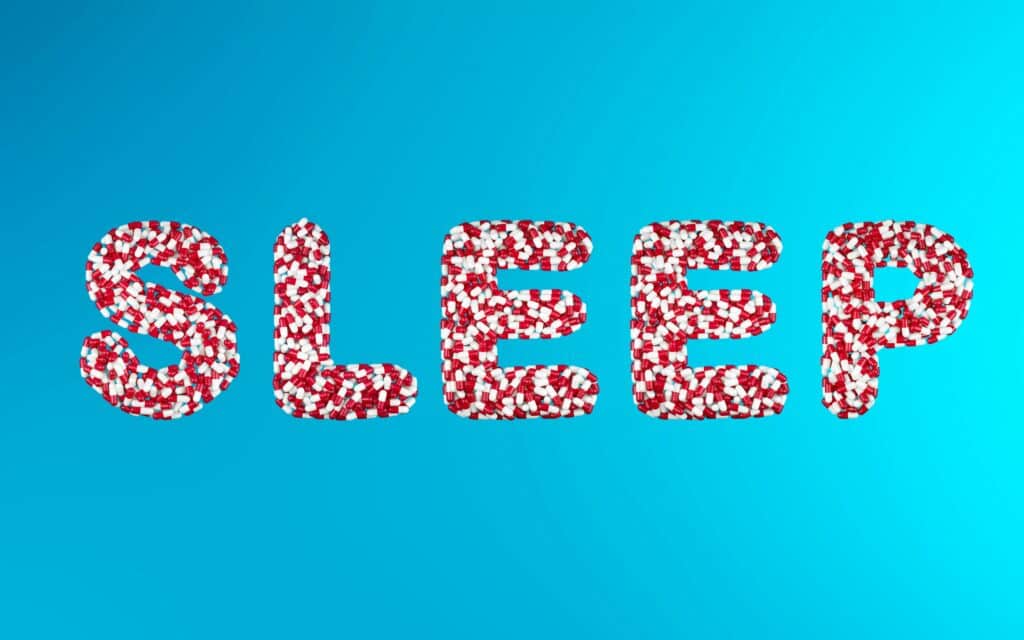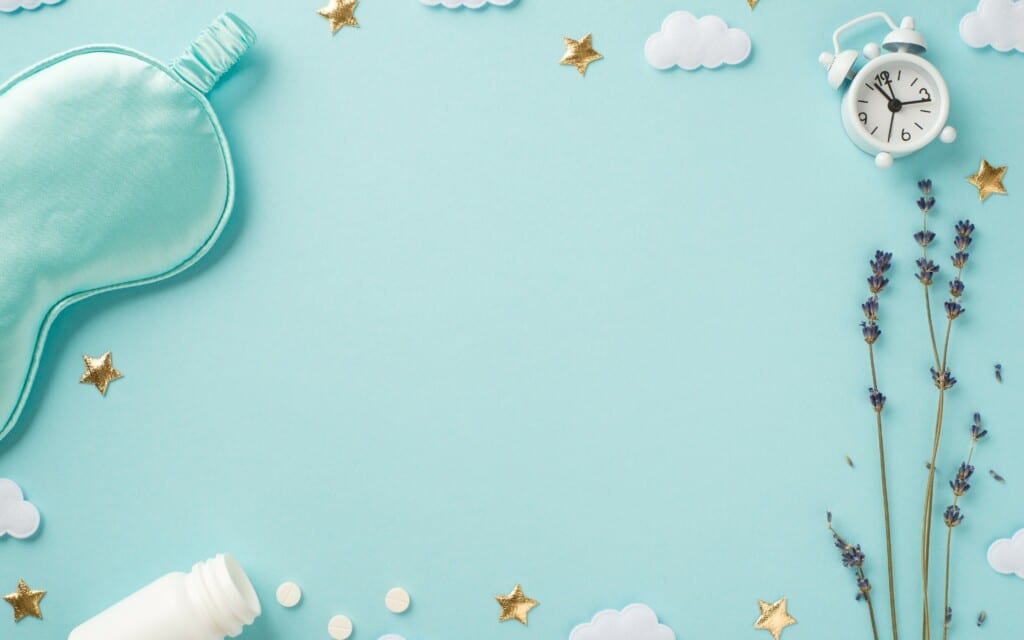The question, “Can I take melatonin with Trazodone for sleep?” is more common than you’d think. Sleeping problems are notoriously complex, meaning the treatment suitable for one person might not work perfectly for you. This is why so many doctors need to experiment with a range of therapeutic options to overcome insomnia and similar sleep issues.
Melatonin and Trazodone are two of the more common options for facilitating a good night’s sleep. However, both of these substances have a very different impact on the body.
In some cases, it’s even possible to take both medications at the same time. However, it’s crucial to consider your specific circumstances carefully. The combination of these medications can cause significant drowsiness, and other possible side effects. Read on to discover the pros and cons of Trazodone and melatonin.
Trazodone vs melatonin: What’s the difference?
Trazodone and melatonin are two medications offered for sleep disturbances. The prescription of Trazodone is intended for the treatment of major depression, generalized anxiety disorder, and panic disorder. However, it can also be extremely useful at handling insomnia.
Melatonin is an “endogenous hormone” produced naturally by the human body in the pineal gland. This substance has a range of effects and roles in the body, but it’s commonly connected with sleep-wake cycle regulation.
Supplementation with melatonin can assist with sleep disturbances caused by jet lag, neurological issues, and shift work disorder. In many countries melatonin is also first choice when managing primary insomnia.
Research shows both of these substances are effective at treating issues of insomnia and improving sleep quality. However, both have their positives and negatives to consider.

Is melatonin better than Trazodone for sleep?
Before we look at the potential of taking melatonin and Trazodone together, let’s take a closer look at what each of these substances can do. As mentioned above, melatonin is actually a hormone we naturally produce in our bodies on a daily basis.
Melatonin is most commonly associated with the regulation of the sleep-wake cycle, but it can also be valuable for growth and various other concepts, like immunity, too. The production of melatonin in the body is sensitive to the amount of natural light we’re exposed to, as well as other factors.
If you don’t get a lot of natural light during the day, you might struggle to produce the correct amount of melatonin. You might also have issues with melatonin if you have certain neurological disabilities, suffer from depression, or work according to an unusual schedule (night shift workers).
Research shows children with autism spectrum disorder lack melatonin. They often need to supplement with extended-release melatonin to get some good sleep.
Melatonin works by inducing the circadian rhythm in the body, influencing when we’re likely to fall asleep and wake up. It’s more intended to regulate sleep, rather than initiate it. Melatonin supplements mimic the natural compounds in your body, to support sleep quality.
Most doctors consider the short-term use of melatonin to be safe. It can sometimes cause some side-effects, such as headaches, bad dreams, excessive sleeping, and drowsiness.
Trazodone and melatonin: What is Trazodone?
Trazodone is a form of depression medication, approved by the FDA for managing the common symptoms of depression. This substance is also regularly used for panic disorder and generalized anxiety disorder. The substance is available in a range of dosages, as well as in normal and extended release forms, depending on the treatment requirements.
Trazodone has “anxiolytic” effects, which means it reduces feelings of anxiety and panic. While there is still limited data available on how Trazodone works to reduce insomnia, studies have shown this substance can be effective at improving sleep quality.
Trazodone works by affecting the balance of specific chemicals in the brain. Experts say this substance can increase serotonin levels – the hormone usually responsible for creating and managing feelings of happiness and wellbeing.
By increasing serotonin levels in your system, Trazodone can help to minimize the symptoms of depression and low mood. However, it also plays a role in sleep regulation. Serotonin, like melatonin, is well-known for it’s influence on the modulation of sleep.
Trazodone often works best when taken 30-45 minutes before your desired time to fall asleep. The medication usually has a 5 hour half-life, so it can cause some drowsiness the next day for some users. On the plus side, this substance has been shown to increase deep sleep.
Like melatonin, Trazodone is widely regarded to be a safe drug for the treatment of depression and insomnia. However, your doctor will need to assess your specific circumstances carefully to define whether this is the right treatment for you.
Similar to most drugs, Trazodone can occasionally have side effects like headaches, confusion, nausea, vomiting, and muscle pain. Some patients may occasionally experience nightmares.
Can you take melatonin and Trazodone together?
So, can you take trazodone and melatonin together? The complexity involved in treating sleep issues often means a number of doctors and professionals recommend combining treatments to get the best results. Because melatonin is a natural substance already produced by the human body, it’s often considered to be safer as part of a combined treatment than some alternatives.
At this time, melatonin and trazodone have not been shown to have any significant side effects when used at the same time. However, there is a chance you may have a higher risk of certain symptoms, like drowsiness, confusion, and difficulty concentrating.
Combining melatonin and trazadone is likely to cause significant drowsiness compared to using just one of these medications alone. Because of this, if you’re taking both of the medications at the same time, most doctors will recommend limiting the use of alcohol. Drinking alcohol can make drowsiness, poor concentration, and confusion worse.
You may also need to avoid any activities which might require a higher degree of mental alertness. Taking these medications before bed should reduce your sense of dizziness and discomfort, but you may find some drowsiness carries over to the next day.
How much melatonin can I take with trazodone?
When asking the question: “Can I take melatonin with trazodone for sleep?” it’s important to make sure you get the dosing right. If you are taking both of these substances at once, your doctor will likely recommend starting with a very low dosage of both.
The typical starting does for trazodone is around 50mg, but there are no withdrawal symptoms, meaning some doctors will increase your dosage to boost the effects if you find you’re not seeing any positive improvements. If your dosage is increased, this will usually happen over an extended period of time, so your doctor can monitor your response.
Melatonin is also offered at a very low dosage to begin with. Most experts will recommend only taking around 1 to 2 milligrams of melatonin at a time, so they can accurately monitor your response to the medication. If you’re taking trazodone and melatonin together, you will need to start with a very low dosage, to reduce the risk of side effects.

Can you take melatonin and sleeping pills together?
Technically, melatonin isn’t a sleeping pill. This hormone is something the body naturally produces to assist with the regulation of various processes, including the sleep-wake cycle. With this in mind, it may be possible to take melatonin alongside a range of other medications.
Not every medication will be suitable for use alongside melatonin. Sedative medications can cause sleepiness and slow breathing. Melatonin can cause the same effects. This could mean taking substances like trazodone and melatonin together isn’t a good idea if you already have breathing problems, or issues with sleep apnea.
It’s worth noting a combination of melatonin and any other sleeping medication will generally cause excessive drowsiness. This means it can be quite problematic to use both medications at once if you need to wake up without any drowsiness the next day. Most experts will also recommend avoiding prolonged use, as you don’t want to become reliant on drugs for sleep.
What should you not take with trazodone?
Though trazodone might be safe to take with melatonin (at the right dose), it won’t be suitable for consumption alongside a range of other drugs. For instance, you should not take trazodone if you’re already using tryptophan, lithium, and medications designed for migraine headaches, like sumatriptan. It’s best to avoid taking this medication with St John’s Wort too.
With all medications, before you begin treatment, it’s important to speak to your doctor about the substances you’re already taking, and make sure it’s safe to pursue your treatment. Your doctor will be able to share any risks there may be when taking multiple medications at the same time.
Can I take melatonin with trazodone for sleep? The verdict
Simply put, it is possible to take melatonin and trazodone for sleep at the same time. However, you will need to be cautious about how you use these medications. Combining any medication can be dangerous if you’re not using the right level of care.
When considering multiple medications for your insomnia or sleep issues, always be sure to speak to your doctor first about the safest way to combine your treatments.
Siestio. Sleep Matters.
Now read these:
—Ramelteon vs melatonin
—Olanzapine for insomnia
—Quetiapine for insomnia
Medical disclaimer
You must not rely on the information provided on our website as an alternative to medical advice from your doctor or other healthcare professionals. For more information read our full disclaimer here.







